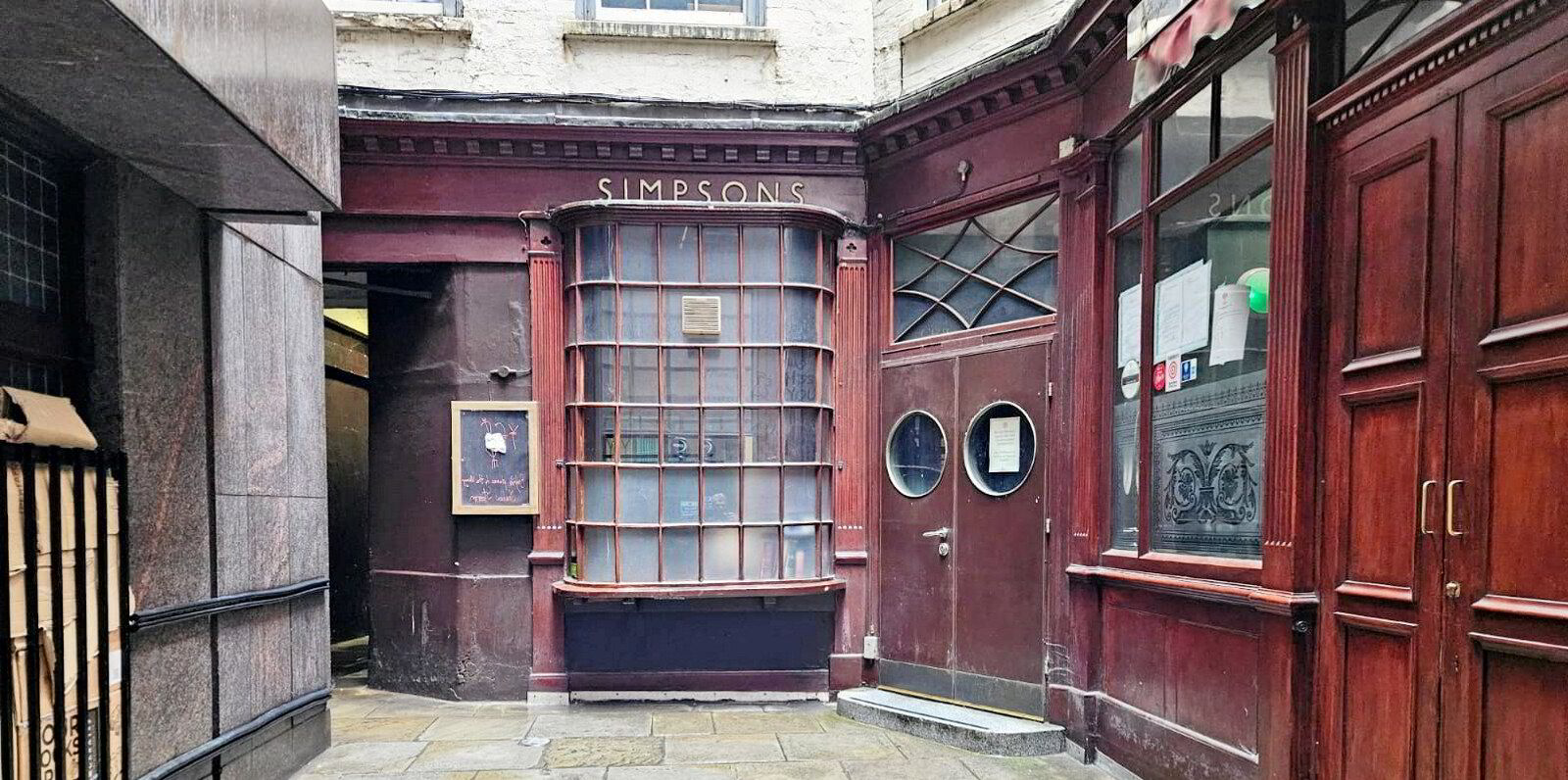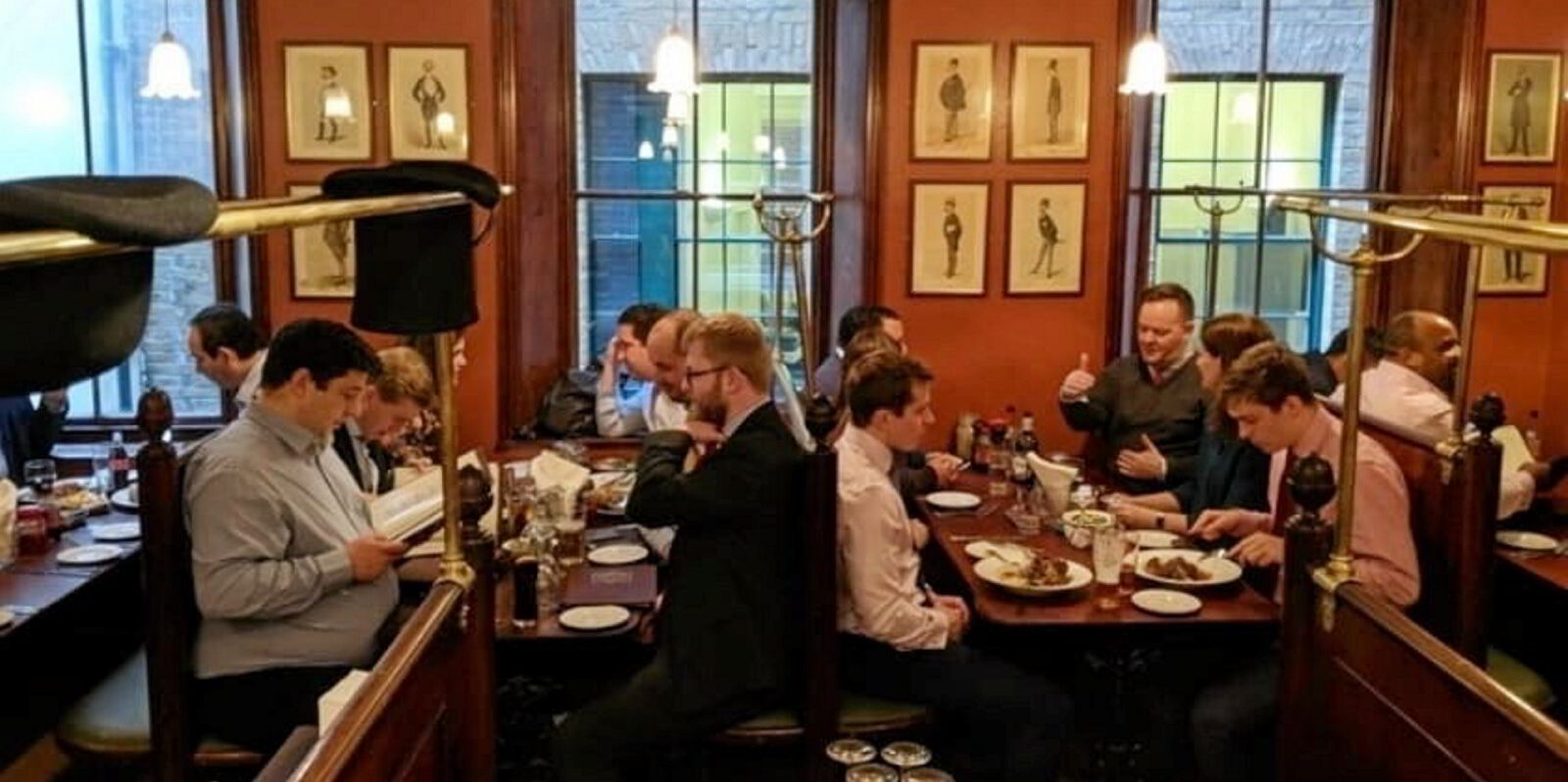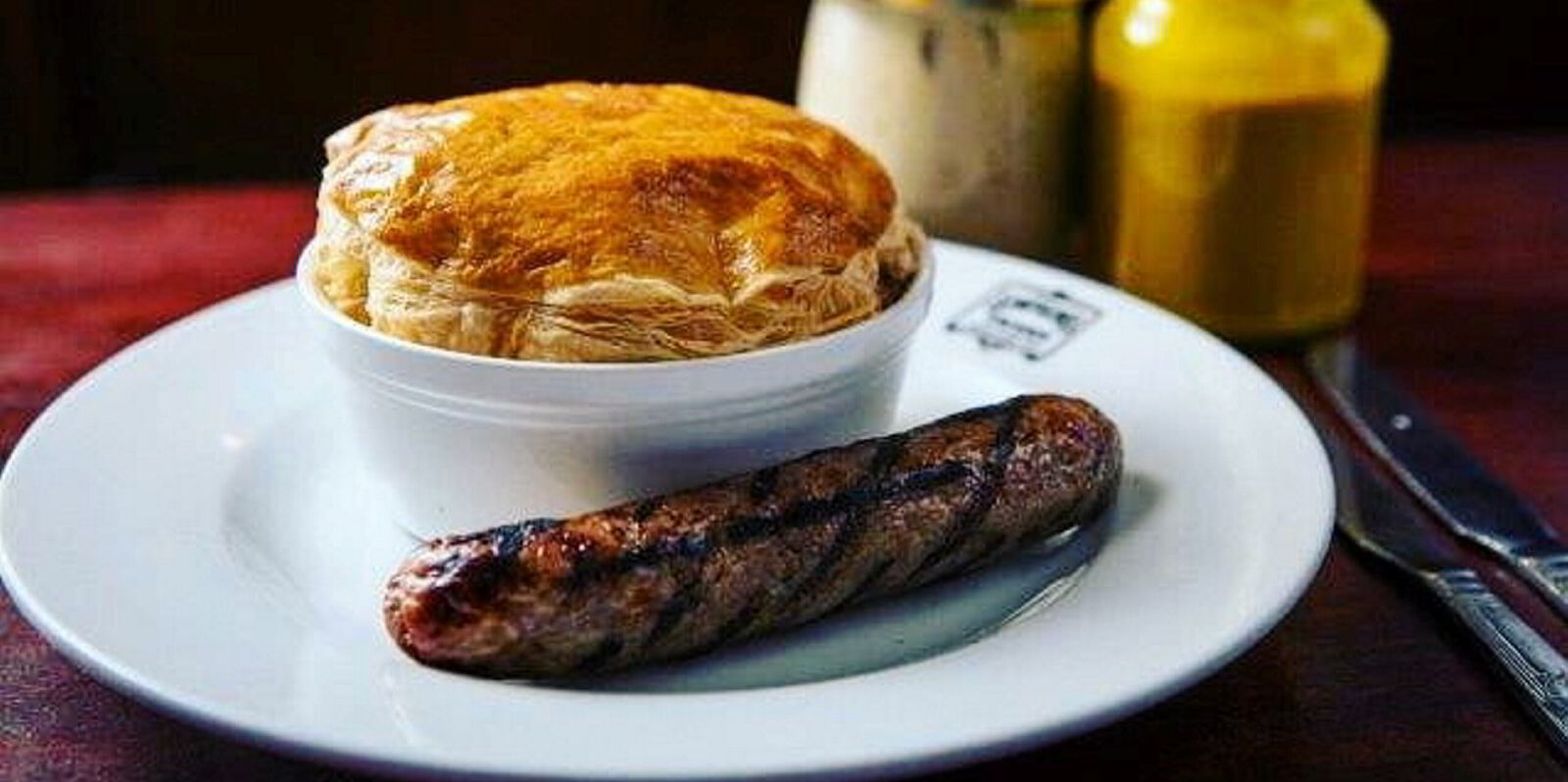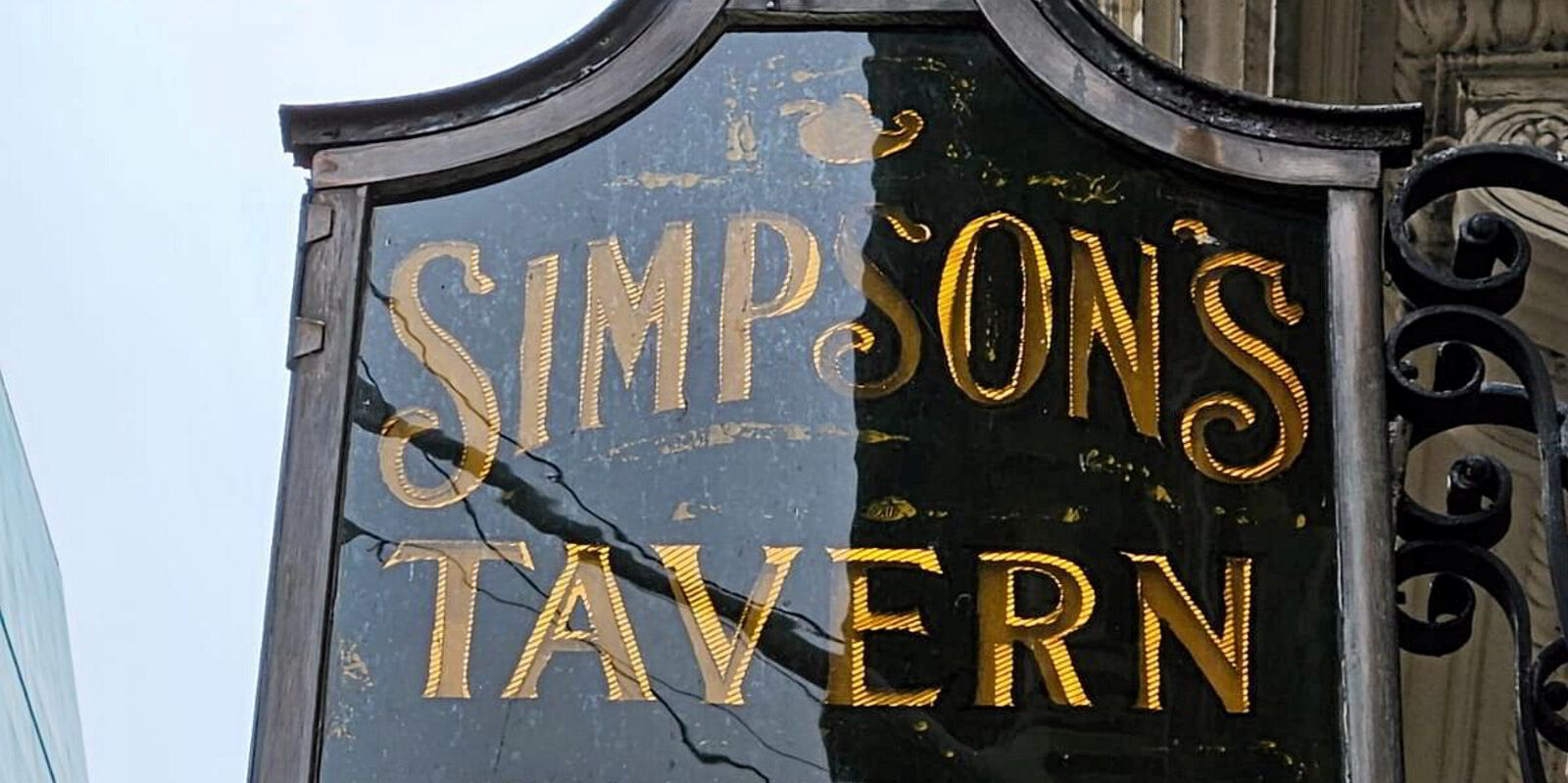For more than 265 years, generations of marine insurers have gathered at Simpson’s Tavern in the City of London to strike deals and spill their claret on the communal tables of one of the world’s oldest and most celebrated informal hubs of maritime trade.
It is said that more agreements were made between marine brokers and underwriters over a glass of wine seated on the uncomfortable wooden pews at Simpson’s than just around the corner in the global insurance marketplace that is Lloyd’s of London.
But perhaps no longer.
While Simpson’s is no stranger to business interruptions from war, pandemic and fire, the doors have now been locked and barred for two years in what looks set to become the longest closure since the restaurant opened in 1757.
At its heart is a bitter dispute between the restaurant’s owners and landlord over debts built up during the Covid-19 pandemic.
The landlord is seeking to wind up the business next month over a debt of £290,000, while the restaurant has brought its own action, claiming it was “wrongly evicted” when the locks were changed on the doors in October 2022, according to court papers.
The building with the restaurant and associated offices is now up for sale and under offer with a guide price of £3.85m ($5.14m).
But the feud has become so bitter that the owners are unlikely to entertain any offer to sell the freehold to the restaurant’s owners and current keepers of the legacy of the 18th-century restaurateur Thomas Simpson.
What’s at stake is more than a business and much-loved institution but a continuing link to the history and stories of the people who built London into a global maritime hub and centre of shipping insurance.
For generations of underwriters, it became the ultimate expression of male-dominated boarding school-style nostalgia, with formidable waitresses serving up old-style chops, pies and stewed cheese for dessert. Populist politician and Reform UK leader Nigel Farage was a regular.
“It’s quite a Marmite place. You either really like it for that nostalgia, or you’re like — No,” said Ed Parker, head of special risks at Tokio Marine Kiln. “There’s not much middle ground with Simpson’s.”

Simpson’s emerged after the initial caffeine-fuelled boom years of the 17th century when men of commerce gathered in the capital’s first coffee houses, including one run by Edward Lloyd’s on the banks of the Thames, to discuss trade and sell insurance in case ships never returned.
When Simpson’s opened at the end of a narrow medieval alleyway in 1757, Lloyd’s List had been publishing shipping news for a couple of decades and the first cornerstones for the later regulated market were being laid.
Simpson’s was one of a number of hospitality businesses in listed buildings that continue to operate in this corner of the City and played a significant role in its growth and character.
The Jamaica Wine House, found on the site of the capital’s first coffee house, and the George & Vulture, another chop house with centuries of history, continue to serve the latest generation of underwriters. The George & Vulture retains its “broker booths” for business over lunch.
In 1805, Thomas Simpson — a descendant of the founder — took out a newspaper advert to “inform his friends and the public… that he has fitted up a very commodious and airy room… where gentlemen who prefer dining on steaks, chops etc may be accommodated with dispatch, attention and reasonable terms”.

That atmosphere has not changed much since, with its brass rail for a jobbing underwriter to hang his hat and a menu that has retained the steak and chops and other solid British staples.
The open charcoal grills in the dining rooms finally disappeared in the 1970s following the latest in a long list of fires in its fat-clogged chimneys.
“The second you walked in the door you could almost feel the hundreds of years of people going in there doing insurance deals,” said Andrew Furr of independent Lloyd’s insurance broker Chesterfield Group.
“It’s a bit of an institution. You always heard comments that more insurance deals have been done in Simpson’s Tavern than in Lloyd’s.
“You can feel the history when you’re sitting on 200-year-old benches eating chump chop and stewed cheese.”
It’s said that one of Lloyd’s most prominent underwriters and innovators, Cuthbert Heath, had his meat cooked on the charcoal grills at Simpson’s and delivered to his desk at London’s Royal Exchange in the style of an Edwardian Deliveroo.
“In his later years, Cuthbert Heath would often have a tray of lunch brought in from Simpson’s in Cornhill, usually accompanied by a bottle of claret,” wrote biographer Antony Brown.
“Sometimes he was so busy that he forgot to eat it. If so, it would be gratefully disposed of by one of the junior clerks.”
And it was at Simpson’s that underwriter Ian “Goldfinger” Posgate held court, according to staff and customers, with his brand of risk-taking during times of war that saw him corner one-fifth of the marine market.
Described as “convivial to a fault” in his Times obituary, he was eventually forced out in the 1980s after he was found to have accepted gifts, including a valuable painting, designed to influence his judgement as an underwriter.
In previous decades when bookings were not taken for lunch, underwriters sent junior staff to queue to reserve their seats before turning up to take their place. Senior staff ate on the ground floor, the juniors were sent upstairs to the less prestigious dining area.
While open only for lunch, it was occasionally hired out for private events in the evening. The wine stains on the ceiling highlighted the penchant for social excess that was a feature of some sections of the industry and has prompted Lloyd’s management to overhaul its code of conduct both in and outside of the workplace.
“What goes on at Simpson’s, stays at Simpson’s,” one insurer told TradeWinds.
Ben Duggan, the current general manager, said that Simpson’s has always reflected the attitudes of the City. While women were first allowed into Simpson’s in 1916, there was little initial uptake in the male-dominated world of insurance.
‘Most heartless conduct’
But you don’t mess with the staff as bootmaker John Cooke discovered when he trifled with the affections of Simpson’s barmaid Matilda Hough in the 1880s.
She took him to court after he recanted on his marriage proposal and a jury ordered the caddish Cooke to pay her £700, nearly a year of his wages.
But in some ways, Simpson’s was highly egalitarian. Until it closed in 2022, diners shared tables allowing the industry’s lowliest to literally rub shoulders with the great and good of the industry.
“You could find yourself sat next to prominent people,” said Richard Nemeth, of broker Tysers. “But I think it was quite exaggerated about how you went there to do a deal.

“If it was such an important deal you wouldn’t go to Simpsons — you would go somewhere posher.
“I’m not saying deals weren’t done and some quite expansive underwriters preferred to go there because the food and drink were well-liked.”
Simpson’s over the centuries was as significant as the coffee houses for building the networking nature of the insurance industry, claims Duggan. “Sharing an insurance portfolio was the same as sharing the Simpson’s table,” he said.
Its history and that of the insurance sector are tightly meshed. The restaurant features underwriter table-tops grabbed from Lloyd’s during its move to the current building in 1986. “They [the underwriters] spilt all their ink on it before, they spill their claret on it now,” said Duggan.
But for some, the current downturn of fortunes of Simpson’s has highlighted the changing nature of the insurance sector and the patchy return to the office after the Covid-19 pandemic.
George Devereese, of S&P Global Market Intelligence, first went there on work experience when it was an informal setting for deal-making and before increased demands for background checks in a new era of sanctions and money-laundering scrutiny.
“Gone are the days when a broker would take an underwriter out for a very good lunch down to Simpson’s … you can be briefed on a fleet and write a line in the afternoon,” he told the International Union of Marine Insurance conference in Berlin last month.
“Now we need to understand that ownership, who the technical managers are, who the operators are and really understand that chain of management… so we don’t fall foul of sanctions.”
Some traditions persist. For years, the waitresses have always asked: “Do you want a sausage with that?” and there are various versions of how that unique Simpson’s quirk started.
Duggan said it was most probably an outcome based on need after an over-enthusiastic former manager over-ordered too much meat.
Spare sausage
But the tradition has stuck, even after the temporary closure of Simpson’s. “We have the odd chap in here bemoaning the loss of Simpson’s,” said Lee Vaughan, the manager of the George & Vulture. “They’d say: ‘You’d get a sausage offered to you all the time’. Which is why we’ve now started offering bloody sausages.”

Vaughan and his partner Jo said they were hoping for the return of Simpson’s as there were more than enough diners to go around, particularly in the middle of the week when the City is at its busiest.
“It’s a bit like a small village here,” said Jo. “Everyone supports each other and you feel like part of that is missing because it’s an empty building, and it’s a shame.”
The closure of the restaurant led to a successful campaign to re-designate Simpson’s as an asset of community value. That would put barriers in the way of any developer trying to change it from being used as a restaurant but would not stop the interiors being ripped out, said Duggan.
But an agent for Bermuda-based seller Tavor Holdings said it was highly unlikely that the current Simpson’s owner, who has run the restaurant for the last four decades, would be allowed to return given the long-running and bitter legal battle.
“That bridge is well and truly burned,” the agent said.
Potential buyers were from the hospitality business and said it was likely that Simpson’s would continue along similar traditional lines, the agent said.
“None of the parties… have been talking about taking out the interior — that’s part of its charm.”
Read more
- Lloyd’s of London profits rise during insurance supercycle
- Wreck removals lift 2023 salvage income after historic low
- London’s $15.7bn marine insurance market faces growing competition from international rivals
- Lloyd’s of London claims gains on diversity and inclusion
- Strong marine sector contributes to bumper profits at Lloyd’s of London






